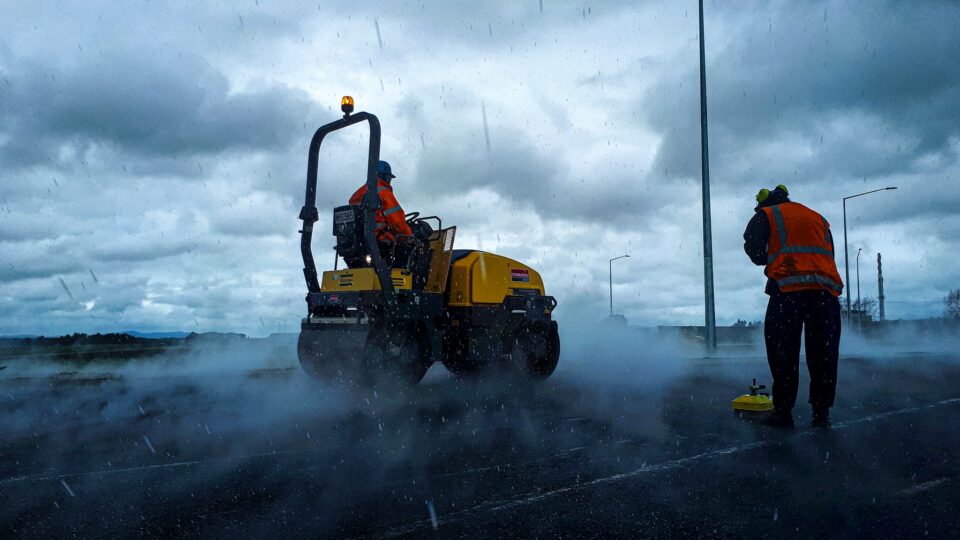Contractors should be involved early on in council and government decision making, there is a lot to fix in regard to infrastructure and our involvement will help. Alan Pollard, CEO, CCNZ.

Last month (March), the Government released its Government Policy Statement on Land Transport 2024-34.This policy statement sets out a $20 billion investment in capital and maintenance works over the next three years and reintroduces Roads of National Significance.
This is welcome, but what is most important right now is the urgency to have actual defined, committed, and funded projects underway. Post-election, investment in infrastructure has significantly slowed, or stopped as local government waits for central government to give direction. This is particularly obvious in water work, but equally relevant across other asset classes.
The policy statement is largely what we expected, although some things are presented strangely. For instance, a funding increase of $640m has been allocated for road maintenance, with a new activity class exclusively for ‘pothole prevention’. While this may resonate with some, it is easy to get caught up in the stigma that potholes have.
I say, let’s call a spade a spade. This is funding for renewals, not potholes. That said, a focus on funding for day-to-day renewals and maintenance is sensible, and more funding will help us catch up after years of ‘sweating the asset’, to ensure our roads are safe to drive on.
I was also disappointed to see the government relying on the antiquated funding methods of petrol tax and road user charges. Pre-election they were bullish about the potential of alternative funding mechanisms including private capital, public-private partnerships, and tolls.
While we need funding to get the programme up and running, it is surprising the NZTA has been left to figure out what these funding sources could be. A lack of funding and financing is plaguing all types of infrastructure at present.
Perhaps the broad, international, research-based approach someone like the Infrastructure Commission might take would be a better way to advance this thinking, get projects funded sooner, and allow the Transport Agency to focus on its core delivery role.
There’s also a reference to ‘value for money’, a phrase the Labour government introduced in the previous draft policy statement. As always, we need to reinforce that this should not be confused with lowest cost.
The procurement process must deliver the best outcomes for our communities, and ‘lowest cost’ does not equal ‘best value for money’.
Finally, it is important to remove the barriers that push costs up – the cost of tendering, consents and consenting delays, and access to clean fill and contaminated fill sites for example.
If the Government is looking for value for money and more efficiency, this is a good place to start. The new fast tracked consenting may bring projects to market faster than has recently been possible.
Overall, the policy statement is a welcome commitment from our Government. And, it signals investment in our roading infrastructure. But in future, we must be more focused on getting things done consistently, across multiple electoral terms.
We will be sharing our submission on the GPS Land Transport with members, and I encourage you to have your say when consultation opens or get in touch to inform our submission.
This brings me to the local approach.
I recently met with a local authority that had commissioned a report into its contract management, which identified there had been large scale cost increases in its projects. However, there was no reference to which costs had increased, or the reason why costs had increased. The statement was a mere generalisation.
There were implications in the report that the cost increases were an indication something was going wrong with the contract. But, without facts or examples to back up that claim, there are many other viable reasons for the cost increases. Interestingly, the report itself had cost tens of thousands of dollars, but appeared to offer little help in identifying the root cause of the cost escalation.
So, the conversation was again centred around how to cut more meat out of the contract, rather than how to achieve better efficiency and cost effectiveness in the way the region operates. I suspect contractors could have told the local authority exactly what each cost was, and why it had escalated.
This made me think about the need for better dialogue between the practical and the ideological. My team and I frequently hear from members who are baffled by this sort of decision making, and dealing with regulatory change that is not fit for purpose.
Industry should have input into these changes, so CCNZ will be stepping up efforts with contractors to provide more detailed local submissions and engagements with councils to make sure the practical knowledge of contractors is considered, and regulation actually adds value rather than just adding complexity and cost.
There’s a lot to fix out there – for instance our current competitive procurement system results in a lot of wasted spend on unsuccessful tenders.
In my view, there needs to be more early contractor engagement and councils and central government agencies should consider contractors as valued partners rather than suppliers under a master – servant arrangement.
We need to support our decision makers with good, practical knowledge about how to achieve value for money, rather than lowest cost. This extends to the services that central and local government deliver – for instance cleanfills and management of local and national resources.
That’s something we’ll keep working towards for our members, along with more appreciation for the great work contractors do constructing and maintaining the country we live in.


Parting words from Jeremy Sole- a final column